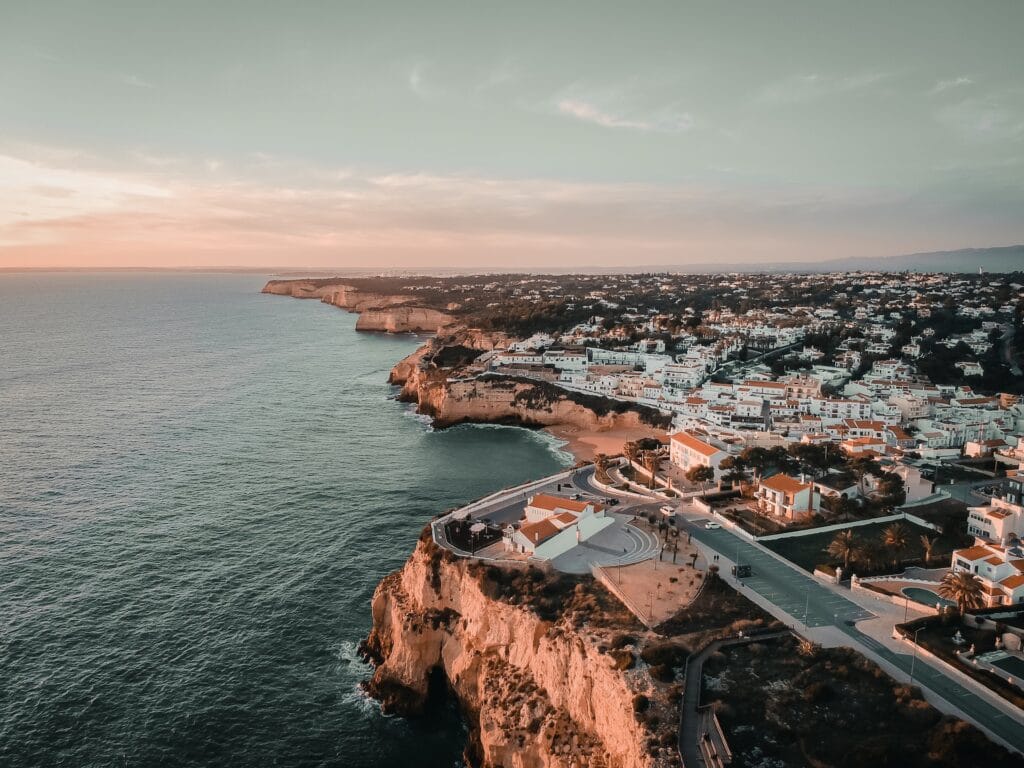From charming apartments in vibrant Lisbon and Porto to idyllic villas in coastal towns, renting an apartment in Portugal offers a broad spectrum of properties to match every preference and budget. And with a surge in demand, especially in sought-after expat destinations, it’s crucial to act decisively yet considerately when you discover a place that truly resonates with you.
But before signing that contract, there are a couple of things that one might need to know about Portugal’s rental process that might not exactly align with what you’re uses to. You’re navigating not only a new market but also a new way of life and legal system.
Costs of Renting an Apartment in Portugal: Lisbon, Porto, and the Algarve
When renting an apartment in Portugal, prices are most dynamic in cities like Lisbon and Porto. However, demand for more coastal towns is also rapidly increasing as well-to-do retirement villages start to pop up.
Lisbon’s Lively Alleys
Portugal’s capital, Lisbon, offers an ever-growing hive of activity and culture that attracts people from all corners of the globe. Apartments for rent in Portugal here have an air of old-world charm in historic neighborhoods like Alfama or Baixa. Up-and-coming areas, such as Parque das Nações, offer sleek, modern living spaces.
However, renting an apartment in Portugal’s architecturally significant buildings come with a price; Lisbon’s popularity also makes it one of the pricier cities for renters.
The capital’s allure is unmatched, so Lisbon apartments for rent are on the pricier side. Expect average monthly rents from €800 for a one-bedroom apartment to around €1,500 for a bit more space.
Porto’s Poetic Streets
With its stunning riverside views and baroque architecture, Porto offers a slightly more laid-back atmosphere. The sense of community is palpable here, and the living spaces reflect this warmth.
The rental market in Porto is a bit more affordable than Lisbon and offers a fantastic quality of life. Porto’s historical center Ribeira, Boavista, and Foz do Douro are popular among newcomers, blending beautiful, historical architecture with the comforts of modern living.
Porto apartments for rent are a bewitching offer with a slightly gentler pull on your wallet. Rents typically range from €600 to €1,200, depending on location and apartment size.
Algarve’s Azure Shores
For individuals who crave a slower pace of life under the sun appeals to you, renting an apartment in Portugal in the Algarve might be your calling. The only caveat is that the rental market here can fluctuate dramatically between bustling summer months and quieter winter ones.
Here, the rental market is as diverse as its coastline, offering everything from luxury villas to cozy apartments for rent in Portugal, each promising you a view to wake up to. Areas like Faro, Albufeira, and Lagos are particularly sought after. The cost of living can be variable; while you may find bargains in lesser-known towns, the more popular areas tend to be pricier.
Algarve apartments for rent vary significantly with season and location, but you might find lovely spots between €700 and €1,300 monthly.

Renting an Apartment in Portugal: Full Cost Considerations
Now, beyond the monthly rent, there are a few additional aspects that will complete your budgeting picture.
- Utilities: These include water, gas, electricity, and internet, which are usually not included in the rent. Generally, budget around €100 – €150 per month, though this can fluctuate with your consumption patterns.
- Maintenance Fees: If you’re renting an apartment in Portugal within a complex, it might come with condo fees, particularly if there are communal facilities. This could be an additional cost, so do check beforehand.
- Insurance: It’s usually optional, but getting renters’ insurance could be a wise choice for that extra sense of security. This typically won’t set you back too much but offers protection for your belongings.
- Council Tax: Often included in rental agreements, it’s wise to confirm this as council taxes vary by location.
Wise Budgeting Tips for Renting An Apartment in Portugal
Budgeting for your Portuguese adventure need not be daunting. With some foresight and planning, you can enjoy renting an apartment in Portugal without financial worries.
- Know your priorities: Decide what features are must-haves (like accessibility, proximity to health services, or maybe a sea view). Focusing on what truly matters to you can help prevent overspending on unnecessary features.
- Plan for the long-term: Especially important for those renting an apartment in Portugal with a fixed income, consider potential rent increases. Engaging in longer lease terms might provide stability and avoid unexpected costs.
- Utility Management: Be energy-smart; turning off lights, using energy-efficient appliances, and heating moderation can save you a bundle in utility bills.
- Embrace local living: Shopping at local markets and eating at less tourist-oriented restaurants can significantly lower your monthly expenses, integrating you deeper into the Portuguese way of life.
- A Little Buffer Goes a Long Way: Life can surprise us, and sometimes not in ways we expect. A small monthly buffer in your budget can make unexpected costs less startling and even provide the freedom for spontaneous joys.
Think of your move to Portugal not as a complex series of tasks, but as the beginning of an enriching chapter in your life’s story. A little planning, some smart choices, and a dash of adaptability will ensure that you’re able to savor every moment of renting an apartment in Portugal with all it has to offer.
Finding a Renting An Apartment in Portugal
If you’ve already decided on the region and have committs to a renting an apartment in Portugal, the next big step is to go out to hunt for your rental property. There are several ways to do this, and here are just some of the few:
Online Platforms and Resources for Long-term Rentals in Portugal
If you’re looking for ways on how to find a rental apartment in Portugal without a local agent, start your search online:
- Websites like Idealista and Imovirtual are the most popular digital shop windows in Portugal’s housing market. They offer a wide range of rental options, from cozy city apartments for rent in Portugal to sprawling countryside homes.
- You can also venture into social media groups and expat forums like Expats in Portugal on Facebook or Expat Forum to connect with others who’ve already taken the leap of renting an apartment in Portugal. Glean from their experiences, and don’t be shy to ask for advice or recommendations.
- Olá Tip: Use the filters on these sites to narrow down your search by location, price, and rental property type. You can even set up alerts for new listings that match your criteria—how’s that for service at your fingertips?
- Casa Sapo and BPI Expresso Imobiliário are also worth your attention. They provide robust search tools and a wealth of listings. And don’t overlook Facebook groups; they can be a treasure trove of insider info and direct landlord listings.
Embracing Short-term Rental Platforms
If you desire to experience a particular area before settling down or need a place while house hunting, platforms like Airbnb can your ticket to convenience before fully committing to renting an apartment in Portugal. Offering flexibility and a variety of housing options, they’re a chance to get to know your chosen locale on a personal level.
Many Airbnb hosts are accustoms to welcoming guests relocating to Portugal and can a goldmine of local knowledge and tips.
Working with Real Estate Agents
While it’s entirely possible to find a home online, there’s nothing quite like having a friend in the business. Real estate agents (or imobiliárias) in Portugal can that friend, offering invaluable local knowledge and experience in renting an apartment in Portugal.
They provide insights you might not find on your own and handle the complexities of rental agreements with ease. Although there’s often a fee involved, the inside perspective and hand-holding through legalities can be priceless peace of mind.
Tips for Viewing Properties and Dealing with Landlords
Arranging to view rental properties is one of the most exciting parts of the journey to renting an apartment in Portugal. As you step through the door of each potential home, you’re not just viewing walls and windows — you’re witnessing the backdrop of your future.
- Schedule multiple viewings: First impressions last, but it’s the second and third viewings that can give you a more realistic feel for apartments for rent in Portugal. Returning for a second viewing, you’ll come with a clearer mind, perhaps at a different time of day. This allows you to observe the natural light at sunrise or sunset and get a feel for the neighborhood’s dynamics—maybe even meet a neighbor or two. It’s an opportunity to notice details that may have slipped by during the first visit.
- Insider Insights: When you’re looking at possible homes, pay attention to not just the living space but also the neighborhood. Is it a good fit for your lifestyle? Are there shops, transport, and services nearby? Remember, renting an apartment is Portugal doesn’t mean you’re going to be inside four walls all the time; you’re becoming a part of a community.
- Build Rapport with your Potential Landlord: A touch of personal connection can go a long way. Sharing a little about yourself and why you’re excited to renting an apartment in Portugal can resonate with landlords. After all, they’re entrusting you with their rental property, and building rapport never hurt anyone.

Legal Requirements and Documentation for Renting an Apartment in Portugal
Contracts in Portugal typically favor the tenant, but it’s still prudent to review the terms meticulously. Things to look out for include the length of the contract, notice periods, and any conditions regarding deposit refunds. So, before signing on the dotted line and handing in your deposit, make sure to sort out these common practicalities.
Essential Documents You’ll Need
Before you even go to a viewing, you can already prepare the following documents typically required before renting an apartment in Portugal. Here are a few:
Número de Identificação Fiscal (NIF) – This is your Portuguese tax number, and it’s crucial for almost every transaction, including setting up a lease. You can apply for this at any Finanças (tax office) or online if you prefer. Once you have your NIF, you’re officially ready to start renting an apartment in Portugal.
Our relocation partner Portugal Residency Advisors® offers a detailed guide on getting your Portuguese Tax Number.
Identity Card (ID) – Whether it’s your passport or a national ID card, having proper identification is another basic document that potential landlords could ask for. Make sure it’s valid and handy for when you need to present it during the rental process. Most agents ask for this even before you can book a viewing.
Proof of Income – Landlords like to know that their tenants can keep up with rent payments, which makes complete sense, right? This could be a work contract showing your salary, recent pay slips, or even a bank statement. If you’re retired, pension statements will work. It’s all about showing that you can comfortably afford renting an apartment in Portugal.
Understanding Renting An Apartment in Portugal Contracts and Terms
Navigating a rental contract in a new country can feel like decoding an ancient script. However, equipped with the right knowledge, you will handle it just like a local!
Key Components of a Portuguese Rental Contract:
- Duration: Most contracts are for one year, but they can be tailored to be long-term.
- Renewal Terms: These should be clearly stated to avoid any surprises.
- Deposit Requirements: Typically, this will be up to three months’ rent.
- Maintenance Responsibilities: Understand what you are responsible for and what falls to the landlord.
- Termination Conditions: Know how much notice must be given by either party to terminate the lease.
Take your time to read through the contract carefully. If it’s not in English, consider getting a professional translation or asking a bilingual friend to review it with you. It’s important that you fully understand every part of your commitment.
Security Deposits and Upfront Payments
When renting an apartment In Portugal, it’s typical to pay one to three months’ rent as a deposit. This acts as a safety net for the landlord to cover any damages or unpaid rent when you leave. Ensure that the terms regarding the deposit—like the conditions for its return—are spelled out in your contract to avoid any later miscommunication.
Additionally, you may need to pay the first month’s rent upfront. Sometimes, landlords request the last month’s rent as well. This can add up, so it’s a good idea to have your finances sorted before you sign anything.

Looking to Invest in Portugal?
Explore our newest listings below!
Frequently Asked Questions About Renting an Apartment in Portugal: Expert's Guide
Can I negotiate the rent in Portugal?
Absolutely, negotiation is part of the process, and there’s often room to discuss terms and rent. Remember, success in negotiation is about finding a common ground that benefits both you and the landlord. Approach it with respect and understanding of the local market conditions.
Are utilities included in the rent?
In Portugal, it’s more common for utilities to be paid separately from the rent. However, this can vary by rental property, so it’s important to ask this question upfront. Make sure any agreement on utilities is clearly stated in your lease.
Can I rent an apartment in Portugal as a non-EU citizen?
Absolutely, as a non-EU citizen, you can indeed rent an apartment in Portugal. The process is straightforward and not unlike what you might expect in other countries. You’ll need some basic documents like your passport, proof of income, and sometimes a Portuguese fiscal number (NIF) to get started.
What is the standard lease duration in Portugal?
Rental agreements in Portugal are commonly for 1 to 3 years, though shorter-term leases are also available, especially for furnished apartments or holiday rentals. Always confirm the terms and notice periods in your lease agreement.
Do I need a guarantor to rent an apartment?
Some landlords may request a guarantor, particularly if you’re a foreigner without a rental history in Portugal. However, this is not always required and depends on the landlord’s preferences and your financial situation.
What is a Portuguese fiscal number (NIF), and do I need it to rent?
The NIF (Número de Identificação Fiscal) is a tax identification number required for various financial transactions in Portugal, including renting an apartment. You can obtain one at a local tax office or with the help of a lawyer or representative.
Is it legal for landlords to ask for multiple months’ rent upfront?
In Portugal, it’s common for landlords to request 1 to 2 months’ rent as a security deposit. However, asking for several months’ rent upfront is uncommon and may be negotiable or avoided with proper documentation of income.
Are pets allowed in rental properties?
Whether pets are allowed depends on the landlord’s policy. Always check with the landlord before signing the lease, and consider requesting a clause in the agreement if pets are permitted.
What is the process for terminating a rental agreement?
For a lease agreement of 12 months you an terminate the agreement after 1/3 of the period plus 90 days of notice period.
How can I find apartments for rent in Portugal?
You can find apartments through online platforms like Idealista, OLX, or local real estate agencies. Networking within expat communities and exploring neighborhood boards can also be helpful in securing a rental property.
What fees should I expect when renting an apartment?
Common fees include a security deposit (typically one month’s rent), agency fees if using a real estate agent, and the first month’s rent upfront. Additional costs like utility deposits may also apply.